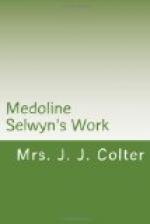“It is not my usual custom, but nevertheless, I accept your invitation with pleasure.”
Mr. Bowen was waiting to speak with his minister, it may be hoping to exchange greeting with us as well. I whispered softly to Mr. Winthrop:
“Would you like to speak to Mr. Bowen?”
“If it is your desire, I will do so.”
“I would like you to speak with him very much.”
I made my way quickly to Mr. Bowen’s side. He was standing a little way down the aisle from us. The grasp of his hand and glance of his eye were like a benediction.
“I was glad to see you here,” he said, in his quiet way, which meant more than extravagant protestations from others. “There was bread for you, I think.”
“Yes, and wine; better far than human lips ever quaffed.”
“The new wine of our Father’s Kingdom,” he said, softly, with such a glad light in his eyes reminding me of some spiritual illumination the flesh could not wholly conceal.
Mr. Winthrop soon joined us, and never did I feel more grateful to my guardian than when I watched his gracious bearing towards my friend. If he had been some noted literary gentleman, he could not have been more genial and polite.
“My ward has talked so much about you that, out of pure curiosity, I came to see and hear you to-night,” he said, as they walked side by side towards the door. A faint flush passed over Mr. Bowen’s face, but he made no reply. I was much better pleased than if he had exclaimed against his own poor abilities, as some would have done, or rhapsodized over his indebtedness to me. I knew from the expression of Mr. Winthrop’s face that he was pleased with him, and on our way home, he said: “You are like a magnet, Medoline. You draw the best types of humanity to you as the lodestone does the steel.”
“You like Mr. Bowen, then?”
“I do not know him well enough yet for that; but he has genius. Da Vinci would have taken him for a model for the beloved disciple if he had lived in his day. I never saw a more spiritual face in any human being.”
“He is like the disciple whom Jesus loved in one thing—he loves the Christ best of all.”
“Was not that a wonderful meeting, Mr. Winthrop?” Mrs. Flaxman asked, after we had seated ourselves cosily by the bright fire in the drawing-room.
“I do not profess to be a judge in such matters.”
“I think a heathen would have felt some before unknown spiritual influence there to-night, if he had understood our language,” I exclaimed.
“Heathen and Christian alike are not so susceptible to spiritual influences as you, Medoline; so in harmony with the unseen and unknowable as you are getting to be.”
“Religion cannot be classed with the unknowable. God only leaves us in uncertainty when we wilfully close our eyes to his teachings.”
“You place no restrictions, then, on the benevolence of your Creator.”




